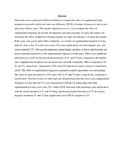Effect Of Supplemental Irrigation On Growth, Yields And Water Use Efficiency Of Tomato (solanum Lycopersicum) And Onion (alliumCepa) In Kibwezi District, Eastern Kenya

View/
Date
2011Author
Origa, O. L.
Gachene, C.K.K.
Kironchi, G.
Onwong’a, N. R.
Type
PresentationLanguage
enMetadata
Show full item recordAbstract
Field trials were conducted in Kibwezi District to examine the effect of supplemental drip
irrigation on growth, yields and water use efficiency (WUE) of tomato (Solanum lycopersicum)
and onion (Allium cepa). The specific objectives were to: (a) investigate the effect of
supplemental irrigation on growth, development and yield response of onion and tomato; (b)
determine the effect of different watering regimes on water use efficiency of onion and tomato.
Both crops were grown under three treatments- two modes of supplemental irrigation at 4-day
interval: once-a-day (T1) and twice-a-day (T2) water applications on each irrigation day, and
control (rainfed, T3). The growth parameters (plant height, numbers of leaves and branches per
plant) responded positively to the supplemental irrigation in both crops. There were significant
differences (p < 0.05) in the growth characteristics of T1 and T2 plots compared to the rainfed
ones. Supplemental irrigation also increased fruit and bulb remarkably. When compared to T3,
T1 and T2, respectively, represented a 79% and 63% increase in tomato (season 1) marketable
yields. The effect of supplemental irrigation compared to rainfed agriculture was outstanding.
The yield of onion increased by 153% and 138% in T1 and T2 plots, respectively, compared to
rainfed plots. The trial results for both crops also demonstrated that the twice-a-day supplemental
irrigation at 4-day interval (T1) was comparatively effective in enhancing yields than
supplementing at once-every-day (T2). Onion WUE increased with increasing water application,
with the results obtained in T1 and T2 being significantly higher than those of T3. In tomato,
irrigated treatments T1 and T2 had significantly lower WUE compared to T3.
